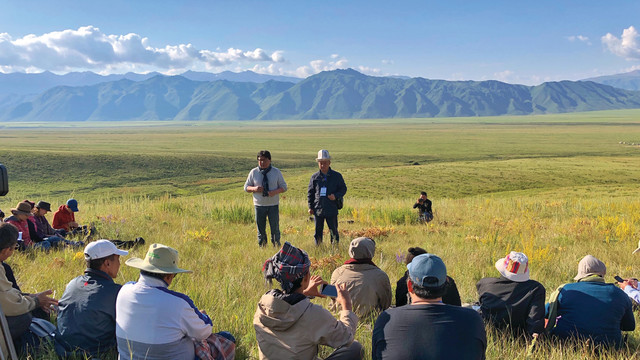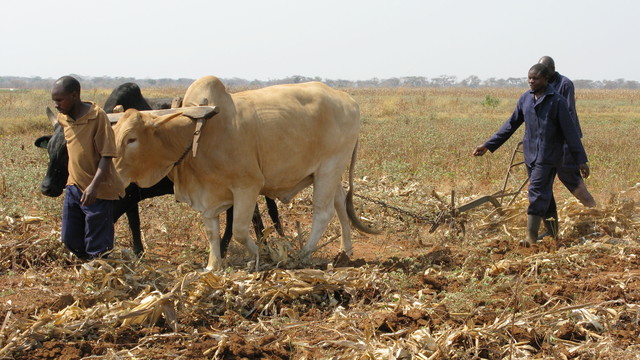Upscaling agroecological practices
This project aimed to promote the dissemination and adoption of agroecological practices around the world through research, lobbying and advocacy efforts.

In a context of a changing climate and growing concerns for more sustainable and healthy food systems, agroecology is gaining momentum as a scientific discipline, sustainable farming approach and social movement.
However, despite growing anecdotal and case study evidence of its multiple benefits, from climate resilience to farm productivity, its promotion by donors as well as in public agricultural policies, research and extension remained quite limited.
A high level workshop organised in London by IIED and Practical Action in October 2015 pinpointed eight major challenges to scaling up agroecology, including:
- Its negative image in the eyes of some donors, governments, researchers and farmers
- The time delay before the benefits of agroecological systems are realised
- Weak knowledge and advisory systems
- The high labour demand of many sustainable agricultural practices
- High transaction costs, given that agroecological systems tend to have a greater number of products (crops or livestock), each with a smaller volume for sale or processing
- Incongruence with key national government priorities and political interests
- Lack of mechanisms for landscape level coordination, and
- Inappropriate incentive systems in research.
It was agreed that by jointly working to address the systemic barriers to utilising agroecological principles in farming systems, we could ensure that millions more smallholder farmers would be able to increase the resilience, productivity and sustainability of their operations.
What IIED did
An action-research initiative grew directly out of the workshop and was led by Practical Action and IIED, focusing on upscaling organic fertiliser value chains in Bangladesh and Nepal.
Soil fertility was an urgent issue in these two countries (and elsewhere in South Asia) because of widespread soil impoverishment caused by modern intensive agriculture, which favours synthetic chemical inputs. This problem could not be addressed solely through conventional approaches, and yet at the same time, ways had to be found to maintain soil fertility without compromising food security.
Greater use of organic fertiliser and/or other agroecological methods of improving soil fertility required coordinated action at many levels, for example with farmers and their communities to understand their constraints and build capacity and confidence; with policymakers to ensure an enabling environment for investors, manufacturers, traders and farmers; and with investors and manufacturers to develop the supply side of the subsector, including agro-dealers and providers of knowledge and advice.
The hypothesis of this action-research was that increased use of organic fertiliser (and other methods of improving soil fertility) could be achieved through promoting or facilitating collaborative mechanisms that could help drive the needed innovation and coordinated action.
Collaborative mechanisms refer to a series of multi-stakeholder platforms combined with action planning and implementation with relevant stakeholders on a common agenda. This approach aimed to address issues in the organic fertiliser subsector and deliver actions that could not be achieved by individual actors or interventions.
Specifically, this research tested and monitored collaborative mechanisms to support (a) national advocacy and (b) private sector investment in organic fertiliser value chains.
The collaboration aimed to create an enabling environment for producers of organic fertiliser (supply) as well as changes in practice at the field level (demand).
In February 2017 Practical Action, in partnership with IIED, produced a five-minute film (below) to illustrate the situation in Nepal and the need for collaborative effort from all actors to boost agricultural productivity through improved soil fertility.
Practical Action and IIED also produced a video about efforts to encourage the use of organic fertilisers in Bangladesh. The 11-minute film, titled 'Fertile Ground', highlighted increasing concerns about poor soil quality and reduced crop yields in this largely agricultural nation. The film outlined various actions being taken to support the manufacture and use of organic fertilisers.
Publications
Additional resources
Video: Market-based approach to scale up organic fertiliser in Nepal, Practical Action
Video: Fertile Ground: a documentary on soil conditions and organic fertiliser in Bangladesh (full version), Practical Action
Video: Fertile Ground: a documentary on soil health (short version), Practical Action
Video: Rejuvenating soil, Practical Action







